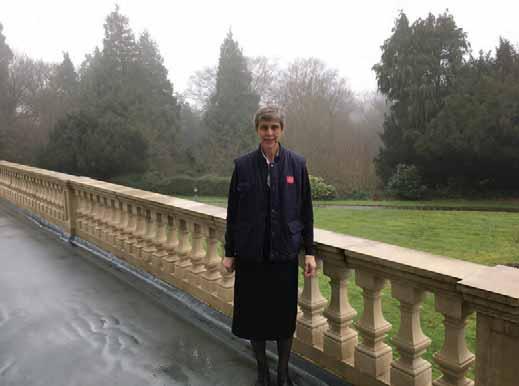
4 minute read
Serving those who serve abroad
Overseas Services Secretary Major Pam Cameron tells Lieut-Colonel Jonathan Roberts how international service personnel are supported
MANY Salvationists will not have heard of Avalon in Kent, but it is a place that plays a significant role in the wider Salvation Army world. Avalon is the base for the UKI Territory’s Overseas Services Unit, which supports personnel on international service.
The Army acquired the house in 1946 when it became an approved school for girls. Later it was a Social Services training and study centre, then its purpose changed again in 2000 to accommodate officers on international service during their homeland visits. The Overseas Services Unit, which had been based at Territorial Headquarters, moved to Avalon five years later. Major Pam arrived in 2008 to take charge of the unit after years of service in Australia, Papua New Guinea and at International Headquarters. She explains Avalon’s purpose: ‘Avalon is often described by our guests as their “home away from home”. The nine self-catering flats – or ten, when the small library is included during peak season – provide space and opportunity for them to relax alone or host visiting family and friends, something many of them miss when they are overseas.’
With the exception of a few international appointments, most overseas terms of service last three years, with service in more difficult locations allowing people to come home for a rest more often. In reality, many international service personnel – officers and non-officers – complete two or more consecutive terms.
‘Whether it is homeland furlough, compassionate leave, business or study, a period of extended transition at the end of a particularly difficult term or returning to the UK and Republic of Ireland to move into an appointment or retirement, Avalon is here to welcome and receive them,’ says Pam.
‘Apart from accommodation, we have room to store a few personal possessions that might be required during furlough. Guests often hurry to the storage room to find their coffee maker, or arrive in summer clothes anxious to find winter woollies. One officer is still living in anticipation of the day we find a way for him to transport his treasured canoe to a suitable place and enjoy a day on the water.’
Accommodation is only part of the territory’s provision for those who serve overseas. Prior to departure the Avalon team tries to guide people through the practical and official processes to ensure a smooth transition to the service territory. There are also opportunities to attend an ‘understanding of cross culture’ day, start language studies and visit Avalon to discuss any areas that might seem daunting.
‘Each person copes with change in their own way, but there are some recurring challenges,’ explains Pam. ‘There are people’s expectations, a change of culture, climate, language or diet to name just a few. For some, there is the additional pressure of living in an area where security is an issue.
‘Everything is a learning curve and it is important to us that our personnel leave the territory with some tools to help them cope through the all-important time of transition.

Officers staying at Avalon
‘When visas have been approved, tickets issued and departures and arrivals have come and gone, technology enables regular exchanges between us. It’s always a red letter day when we receive emails and newsletters, sharing the joys, the funny incidents and the blessings as our people transition into their new surroundings. They often share a few concerns and points for prayer as well. For our part, we try to ensure that all those serving overseas receive Army news from the UK and the Republic of Ireland, so that they still feel very much part of the territory even though they are in ministry away from it.’
The Overseas Services Unit is able to give some practical support too. For example, through the financial generosity of colleague officers in this territory, the unit is able to send a Christmas gift to every person overseas as well as their children living with them. And if there is a special personal need, the unit can often offer specific assistance.

Major Pam Cameron
‘International service is not all challenge!’ Pam says, reassuringly. ‘The smiles on our friends’ faces tell their own story when they relate a little of the work they are involved in – the sense that they are truly making a difference and their desire to stay and do a little more. Every person who has been on international service has stories to tell; what a book it would create if they were written down!’
At the end of a period of service overseas, whether one term or more, the Avalon team is part of the practical transition home. It provides accommodation and co-ordinates the various appointments that are required as well as a post-assignment crosscultural orientation.
The Overseas Services Unit has a special ministry to the territory’s international service personnel. And as its head, Pam has the experience to make sure it is as supportive as possible.
‘I have had the privilege of living in some of those “other” shoes,’ she says. ‘My service at IHQ, in Australia and Papua New Guinea has given me the opportunity to see overseas service from so many different angles.
‘If I can help our personnel for service, keep them in touch with home when they are overseas and then help them during the transition home, I am thankful for the privilege. Being the Overseas Services Secretary in this territory is a really fulfilling role. And as one of my favourite psalms says: “If I rise on the wings of the dawn, if I settle on the far side of the sea, even there your hand will guide me, your right hand will hold me fast” (139:9 and 10). It’s true. Just ask any of those who have tried it!’







